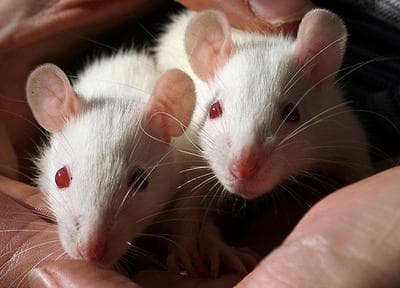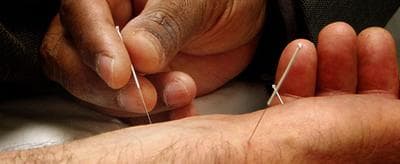Advertisement
Could Stressed-Out Rats Hold Clues To How Acupuncture Works?
Could rats subjected to chronic stress — their paws dunked in icy water — hold the key to how acupuncture works? And could all those needles, traditionally thought to unblock the flow of life energy, in fact be calming the body's stress response?
That's what Ladan Eshkevari, a licensed acupuncturist, physiologist and associate professor of nursing at Georgetown University School of Nursing theorizes after treating a group of stressed-out rats with acupuncture. In a study published recently in the Journal of Endocrinology, she found that the treatment actually lowered levels of the rat-equivalent of cortisol, a stress hormone, as well as other proteins and hormones secreted by biologic pathways involved in the stress response.

"Our study is one of the first...to show how acupuncture works on chronic stress," she said. Understanding the ancient Chinese practice on a molecular level, she adds, might make it more acceptable in a mainstream Western medicine context.
Rats, of course, are rats; they're mammals, sure, but they don't always behave like people. Still, Eshkevari's hypothesis is that rats and humans may be comparable when it comes to their response to chronic stress. She posits that acupuncture works by quieting a key pathway — the hypothalamus-pituitary-adrenal axis — that drives the production of critical stress hormones in the body. Cortisol in high levels has been linked to depression, anxiety, cardiovascular disease, insomnia and other conditions.
More than 3 million adults in the U.S. use acupuncture each year, according to the National Institutes of Health, yet "there has been considerable controversy surrounding its value as a therapy and whether it is anything more than placebo." Despite numerous studies reporting its benefits for chronic pain, stress and other conditions (and the fact that it's been used for over 2,500 years across Asia) experts says there's no clear understanding of how, exactly, it works.
(Though earlier studies have shown how, when needles are inserted into the body, all sorts of neuro-chemicals are released and how acupuncture can blunt the stress response.)
Here's how the NIH describes the practice:
According to traditional Chinese medicine, the body contains a delicate balance of 2 opposing and inseparable forces: yin and yang. Yin represents the cold, slow or passive principle. Yang represents the hot, excited or active principle. Health is achieved through balancing the 2. Disease comes from an imbalance that leads to a blockage in the flow of qi—the vital energy or life force thought to regulate your spiritual, emotional, mental and physical health. Acupuncture is intended to remove blockages in the flow of qi and restore and maintain health.

Personally, I've used acupuncture for a range of ailments: from fertility and respiratory problems to anxiety and eczema (a fairly out-there San Francisco acupuncturist had me talk to my skin while he placed the needles). I've always been uncomfortable not knowing the mechanics of it all; the explanations of "qi" or "chi" energy and meridians never felt satisfactory. But I have to say, in some cases, I was pretty sure the treatments calmed me and sometimes dramatically eased my symptoms.
I'm not alone: the flow of "qi" can be a tough concept for Westerners to grasp. A close engineer friend actually quit acupuncture even though it was relieving his back pain because he couldn't bear what he felt to be the totally unscientific explanation.
But lowering stress levels? That's something Westerners get. Eshkevari said she sees her rat study as a way to start "translating Eastern practice to the West." (She's also a nurse anesthetist, and the American Association of Nurse Anesthetists funded her work.)
Dr. Bridget Chin, a general surgeon, works as an integrative medical acupuncturist at Spaulding Rehabilitation Hospital in Boston treating patients with chronic pain.
She says that while "we don't know for sure the mechanism" in acupuncture, "all" of her patients feel better after treatment. "I would say almost 100 percent of my patients who receive acupuncture find their stress is reduced," she said. "If you reduce stress, you reduce chronic pain."
"I used to think it was voodoo, and I was a skeptic," she said. "I am still skeptical of anything that claims a miraculous cure. I'm coming from a very Western point of view." But the results, she says, are evident: "I used to think it was placebo, but it's not placebo, that only works for 24-48 hours; acupuncture takes longer, it works with your own body's immune system and nervous system." She says 80 percent of the hundreds of patients she sees every year also report decreased pain. "That's why we really should have it available to all, not just the ones who can pay."
Indeed, while acupuncture clearly isn't as alternative as it used to be (the New York Times recently reported that several states will include it as an essential health insurance benefit under the Affordable Care Act) many insurers still don't cover it.
Emmanuel Pothos, PhD, an associate professor of Molecular Physiology & Pharmacology at Tufts University School of Medicine in Boston, is currently researching the placebo response in rats (yes, he says, they have one too). He's not an acupuncture specialist but says Eshkevari's finding may also hold true in humans. "I think what the study clearly suggests is there is translational potential here, and they should really pay attention to these pathways," he said.
The genesis of the study came when Eshkevari worked as an acupuncturist and saw a lot of people in pain.
Sometimes, she says, acupuncture eased their pain — sometimes it didn't. But many of those who remained in pain returned again and again for treatment. "They had a greater sense of well-being, they slept better," she said. "Even if the pain hadn't subsided, they could deal with it better."
So, Eshkevari began to think, maybe acupuncture doesn't work directly on pain. Maybe, in a kind of therapeutic end-run, it works, instead, on stress.
She designed a series of studies using a group of male Sprague Dawley rats to test the effect of electronic acupuncture (so all of the rats could get the same "dose") on levels of proteins and hormones secreted by biologic pathways involved in the stress response. She used a particularly potent acupuncture spot on the rats, called the "Zusanli," that's on the leg just below the knee — just as it is in humans.
To get the rats acclimatized to being handled in the lab, Eshkevari put them head first into a cotton sock where they received the electronic acupuncture treatment.
Here are more study details from the Georgetown news release:
The study utilized four groups of rats for a 10-day experiment: a control group that was not stressed and received no acupuncture; a group that was stressed for an hour a day [Eshkevari dunked one of their paws into ice water] and did not receive acupuncture; a group that was stressed and received "sham" acupuncture near the tail; and the experimental group that were stressed and received acupuncture to the Zusanli spot on the leg.
The researchers then measured blood hormone levels secreted by the hypothalamus pituitary adrenal (HPA) axis, which includes the hypothalamus, the pituitary gland and the adrenal gland. The interactions among these organs control reactions to stress and regulate digestion, the immune system, mood and emotions, sexuality and energy storage and expenditure.
They also measured levels of NPY, a peptide secreted by the sympathetic nervous system in rodents and humans. This system is involved in the "flight or fight" response to acute stress, resulting in constriction of blood flow to all parts of the body except the heart, lungs and brain (the organs most needed to react to danger). Chronic stress, however, can cause elevated blood pressure and cardiac disease.
"We found that electronic acupuncture blocks the chronic, stress-induced elevations of the HPA axis hormones and the sympathetic NPY pathway," Eshkevari says. She adds that the rats receiving the sham electronic acupuncture had elevation of the hormones similar to that of the stress-only animals.
Eshkevari says this research complements her earlier reported work that focused only on NPY. In that study, Eshkevari and her team found that NPY levels were reduced in the experimental group almost to the level of the control group, while the rats that were stressed and not treated with Zusanli acupuncture had high levels of NPY.
Clearly, she said, the next step is to test the findings in humans.
Dr. Jack Killen, deputy director of the NIH's National Center for Complementary and Alternative Medicine, said by email there are a number of studies underway to understand why people experience pain relief following acupuncture treatment, including:
--Imaging studies of the central nervous system have shown that acupuncture affects structures involved in affective/suffering components of endogenous mechanisms of pain perception, pain processing, and placebo responses; and in directing attention
--Neurochemical studies are exploring effects of acupuncture on neurotransmitters such as endogenous opioid peptides and noradrenaline that are associated with endogenous mechanisms of pain modulation; and whether acupuncture increases nonenzymatic nitric oxide generation and the role that may play
All of this research may ultimately improve treatment and provide a better understanding of acupuncture's mechanism of action. For now, some people are happy not knowing the "how" behind it all.
A friend with cancer who has been getting acupuncture for years to boost her energy levels during chemotherapy told me: "I actually don't care how it works...it would be interesting but it doesn't matter to me." She said she recently had to skip acupuncture for 40 days and could really feel the difference. "It seems like it clears the channels," she said, "to keep my energy flowing more smoothly."
This program aired on March 22, 2013. The audio for this program is not available.
